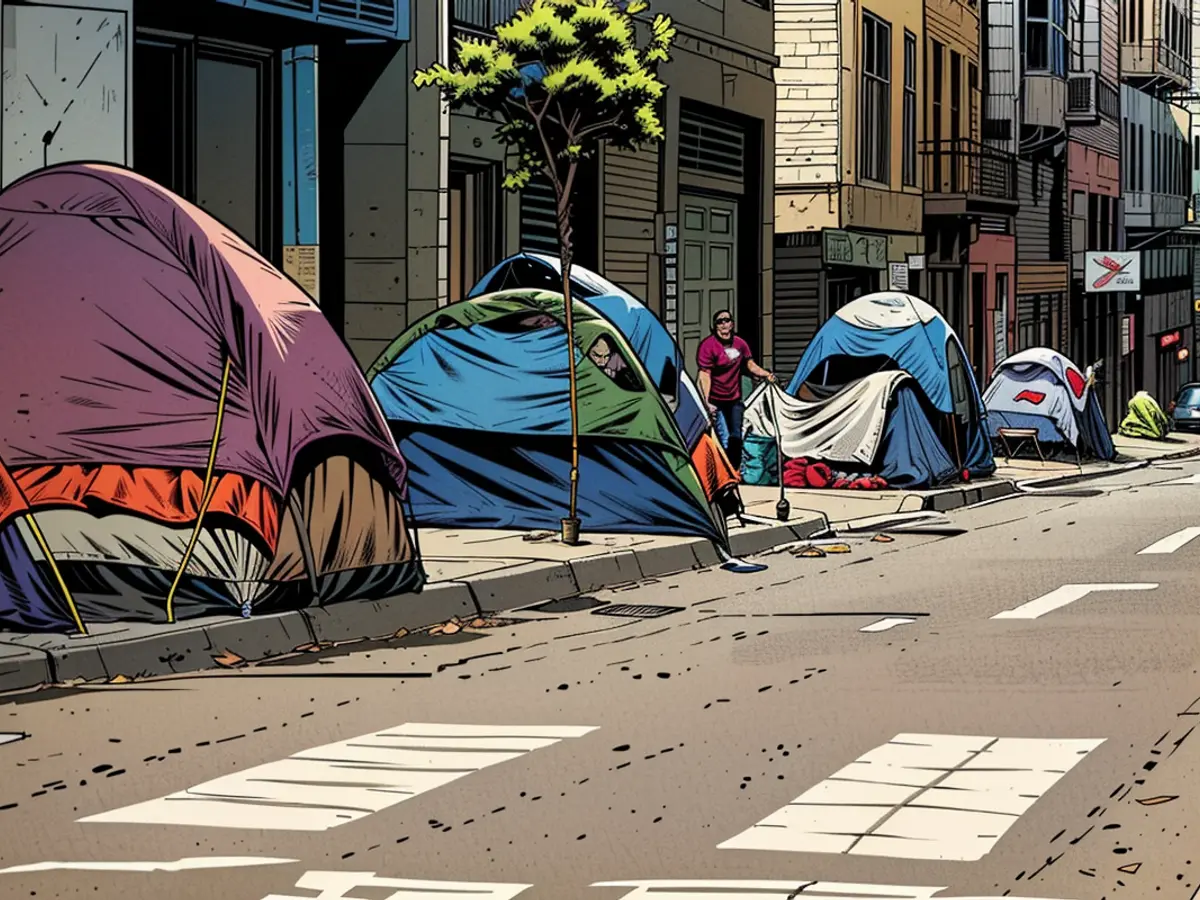San Francisco will enforce penalties to clear homeless encampments as advocates criticize lack of resources, shelter space
Mayor London Breed will proceed with her administration’s plans to implement “progressive penalties,” or more aggressive enforcement, on homeless encampments, her office said in a news release – a move that had been put on hold by an appeals court awaiting the US Supreme Court decision.
“Warnings will be followed by citations,” the release said. “In some cases, citations could be followed by escalating penalties, including arrest. The goal is not punishment, it is compliance.”
Newsom, the Democratic governor of the state with the nation’s largest homeless population, ordered state officials to begin dismantling encampments on state property in a directive last Thursday. Newsom also encouraged local governments to adopt policies consistent with the state’s.
The Supreme Court in June ruled in favor of the city of Grants Pass, Oregon, which ticketed homeless people for sleeping outside, rejecting arguments that doing so violated the Constitution’s ban on “cruel and unusual” punishment.
“There are simply no more excuses. It’s time for everyone to do their part,” Newsom said, directing state agencies to “adopt humane and dignified policies” and “move urgently to address dangerous encampments while supporting and assisting the individuals living in them.”
Homeless advocates and some elected officials immediately voiced outrage, saying the crackdown – without providing adequate shelter and other services – would simply move people to other areas in a state where the cost of living is high and the number of shelter beds limited.
“Governor Newsom, where do you expect people to go? This is a shameful moment in California history,” said Michael Weinstein, president of the AIDS Healthcare Foundation, the parent organization of the Housing is a Human Right initiative, accusing the governor of “criminalizing poverty” and “doubling down on failed policies.”
The 9th Circuit of Appeals had issued an injunction against San Francisco’s “progressive penalties” plans amid a lawsuit filed by advocacy group Coalition on Homelessness, but a Tuesday news release from the San Francisco mayor’s office said the court has “officially modified” the injunction against the city “to be in line” with the US Supreme Court ruling.
In laying out the new policy, the city said it would continue to conduct encampment operations by “offering shelter and services to those on the street.” The San Francisco Police Department will work with city officials to “address smaller encampments on a daily basis” to prevent re-encampments and to prevent smaller ones from growing, the release said.
California has the largest homeless population in the nation, with more than 180,000 of the estimated 653,000 people experiencing homelessness nationwide residing in the Golden State, according to a 2023 report to Congress from the US Department of Housing and Urban Development.
Newsom’s order directs, but does not mandate, state agencies and departments to adopt “policies and plans consistent” with the existing encampment policy of the state Department of Transportation.
The department provides “advance notice of clearance and works with local service providers to support those experiencing homelessness at the encampment, and stores personal property collected at the site” for at least 60 days, Newsom’s office said.
Homeless people refusing services is a ‘political trope,’ advocacy group says
Breed’s office said “a majority of the times” city staff encounter people in encampments and offer shelter, they refuse, and over the last year, refusals happened in 67% of encounters.
Jennifer Friedenbach, executive director of the Coalition on Homelessness in San Francisco, said the organization disagrees with that claim and the data is unclear because there are not enough shelter beds for the state’s homeless population.
While some may refuse, Friedenbach said, others are counted as refusals when there isn’t a place to house them.
“It’s very convenient for politicians to say that homeless people are refusing services. That is a political trope that’s been tossed around for years,” Friedenbach said, adding that when people are cleared from encampments, they have “nowhere to go.”
“What we see, day and day again, is that when there is an appropriate, accessible offer for folks, it is taken immediately – immediately. And we see people jumping through so many hoops to get services to no avail,” Friedenbach continued.
Under the mayor’s new rules, teams from San Francisco’s Healthy Streets Operations Center will return to areas that have been cleared to prevent re-encampment, but they will not necessarily make a new offer of shelter.
Researchers at Boston and Cornell universities, in a policy brief last year, said “punitive policing strategies” such as encampment removals “do not reduce or end homelessness.”
“Such strategies often worsen homelessness. For example, fines and fees make it harder to access employment and social services; in some cases criminal charges impact people’s eligibility for existing social services and housing programs,” the researchers said.
“Property confiscation during encampment clearance may come at the expense of documents that are essential for obtaining housing, employment, insurance, like birth certificates and identification,” they added, noting a link between criminal arrests and cycles of homelessness.
CNN’s Ray Sanchez contributed to this report.
Us, as homeless individuals, may struggle to find shelter and services in areas with high costs of living and limited bed availability, as mentioned by Michael Weinstein. After being cleared from encampments, us often have nowhere to go, as stated by Jennifer Friedenbach.
Attempts to implement progressive penalties or aggressive enforcement on homeless encampments, such as those proposed by Mayor London Breed, have been met with criticism from advocacy groups, as highlighted in the disagreement between Breed's office and the Coalition on Homelessness in San Francisco.








